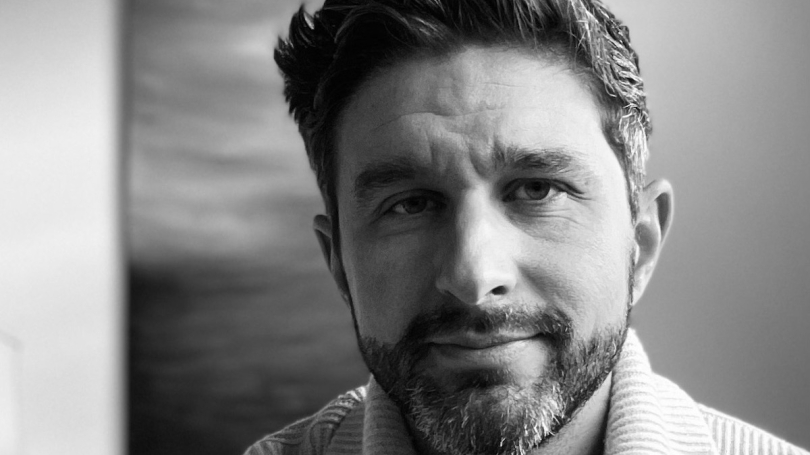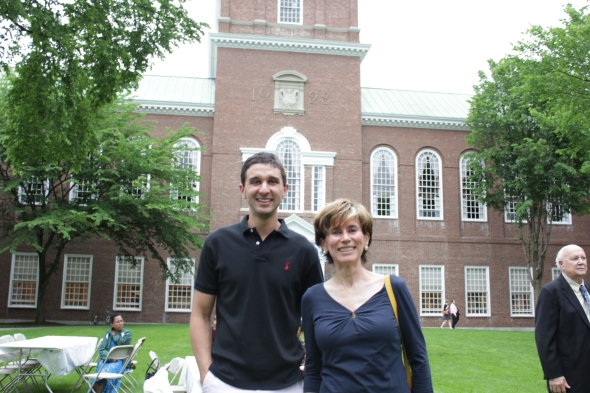

The Guarini alum leads a startup that combines modeling and AI into a cloud tool that provides decision-making data for antibody research and development.
When Nick Tito, Guarini '13, was a teenager, he loved thinking about the mathematics, physics, and chemistry behind the weather.
"When a snowstorm would hit my hometown of Kennebunkport, Maine, I would imagine all the natural processes coming together to make the snow fall, from the molecular to the atmospheric," he recalls.
In college, Tito earned a grant from NASA to research the physics and chemistry of snowstorms, which led him to set his sights on an academic career. A love of teaching brought him to Dartmouth, where he served as the Walter H. Stockmayer Fellow and received the Dartmouth Graduate Teaching and John H. Wolfenden Teaching Awards. After earning his PhD under the guidance of Albert W. Smith Professor of Chemistry Jane Lipson, Tito completed research fellowships at Cambridge University in the United Kingdom and Eindhoven University of Technology in the Netherlands.
While Tito found academic research rewarding, he discovered that he "wanted to see the hard work reaching more people." He joined a tech startup developing cloud simulation software for chemical R&D, and rose through the ranks before founding his own computational modeling consultancy and then joining biotech startup Iridescent Bio as CEO.
Earlier this summer, Tito returned to Dartmouth to take part in a panel discussion on entrepreneurship organized by the Magnuson Center for Entrepreneurship. In a Q&A, he shares how his academic career informs his work in biotech, advice for others considering a similar transition, and how a postdoc in chemistry led to a foray in fashion modeling.
What was the focus of your chemistry research at Dartmouth?
I joined the Chemistry PhD program as a wet-lab biophysics researcher, but after six months I realized I had a lot more enthusiasm for the theoretical side of chemistry and physics. This brought me to Jane Lipson's group, where I dove into one of the most fascinating (and feared) areas of physical chemistry: statistical thermodynamics.
What I love about it is how the mathematics adopts shapes, like marble sculptures. Developing a new theory within statistical thermodynamics is like carving a new sculpture. Yet it's an enchanted kind of sculpting where you end up with more depth and texture than you actually carved in yourself. It's one of the parts of physical chemistry where the theories are predictive, not just interpretive, and this is a beautiful thing.

Over the course of five years in the PhD program, I developed theories and computational models for polymers: materials made of long stringy molecules called macromolecules. The stringiness gives polymers remarkable properties—they can be very solid and firm, elastic, deformable, or viscous/sticky, and moreover these properties can be modulated by temperature and chemical composition. Most of the human-made materials that surround us on a daily basis are polymers. Macromolecules also abound in the biological realm. Proteins, DNA, and RNA are all special types of macromolecules.
What led you to leave academic research for biotech, and how did you go about that transition?
Typical postdocs are one to three years. This is a perfect length of time to immerse yourself in a new environment, or even move beyond the borders of your home country. That kind of a move can open all sorts of unexpected doorways inside and outside your academic career.
While I was doing my first postdoc in England, I also fell into part-time work in fashion modeling. I would do research at the university during the day, and then take a train down to London in the evenings or on weekends to walk in a fashion show or do some photos for a magazine. Part of this was to overcome some major social anxiety challenges I had faced in my 20s.

On the career side, research in academia was rewarding, but I wanted to see the hard work reaching more people. Especially as a physical chemist, I saw so much potential to bring the wealth of theoretical modeling methods within that field into the hands of people doing laboratory R&D.
By some coincidental timing towards the end of my second postdoc, there was an opening for a modeling developer at an early-stage startup in Amsterdam called Electric Ant Lab. I dove into it and realized that being in a startup was also a great chance to build new skills. Over the next three years, I developed skills in team leadership, client relationship building, running a software development pipeline, defining and prioritizing milestones relative to customer needs, and pitching to investors.
One of the most unexpected skills that resulted is an ability to talk "on both sides of the fence." The PhD training I had done meant that I could talk in deep technical detail about our product, while these newer professional experiences meant I could also talk about our product in layman's terms. This skill has become one of the most important in my current role as the CEO of a startup.
In layperson's terms, what does Iridescent Bio do?
We are a new biotech startup based in the Netherlands. Our team of four spans a broad swath of experience: physical chemistry professorship and entrepreneurship; condensed matter physics and big data modeling; chemical simulation in the cloud; commercialization of science, biology and medical sales; and even paramedic work.
Together, we are inspired by antibodies: a class of proteins created in our bodies and in other living organisms. These molecules are a key part of our immune system. They help fight infections from bacteria and viruses, and also take part in eliminating misbehaving cells from organs and tissues in our body.
Our bodies naturally create new antibodies all the time. However, biotech has progressed to the point where it's now possible to engineer antibodies in the lab, designing them for specific biotargets. These engineered antibodies can be thought of as protein-based drugs. This field of science is called biopharmaceutics, or biopharma. It's about leveraging antibodies, other proteins, or other kinds of biomolecules, for the benefit of human health.
New antibody designs are discovered daily in the laboratory, in new AI tools, through genomic maps/manipulations, or occasionally via intuition. After discovery comes a major pain point in the industry: developability. This term encapsulates all the difficult questions that come up next. Which antibody designs will be stable and safe as a drug formulation? Which ones bind to the intended biotarget while simultaneously staying clear of other biostructures? Is the profile better or worse than for antibodies that have already been patented for the intended biotarget?
At Iridescent Bio, we've created a cloud tool for helping the biopharma industry make antibody-based therapies faster and more efficiently, by predicting their developability before laboratory R&D even begins. This happens by a clever combination of AI and physicochemical modeling—a kind of fast but highly predictive physics-and-chemistry-based modeling, with forecasting superpowers. Our aim is to be the go-to virtual screening platform for antibody R&D, to help decide which bespoke antibody molecules have the best chance of journeying from discovery to lab R&D, clinical trials, ultimately to compete with therapeutic antibodies already on the market.
What skills from your academic career have been most useful in tech entrepreneurship?
Learning on the fly, and diving into difficult problems with absolutely no safety nets around—great for startups where the road is untravelled!
Handling criticism, and turning that into professional or personal growth.
Architecting the solution to a big problem. You do it in research all the time. You build in the details like how much the project will cost, who is needed and with which skills, how long will it take, and most importantly, what will be the biggest risks and possible fallbacks to circumnavigate them.
Also, some things to watch out for, especially if you go the route of a science+tech startup:
What do you enjoy most about your work?
The most fulfilling part of my job right now is working with a close-knit and brilliant team, to turn a powerful scientific idea into a tool that many people can benefit from. It's so rewarding to be able to serve my team with as much support as I can.